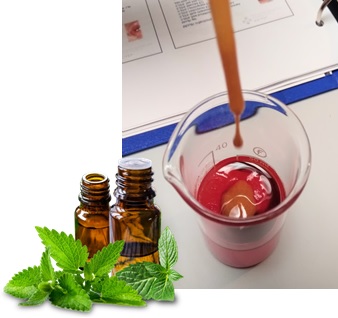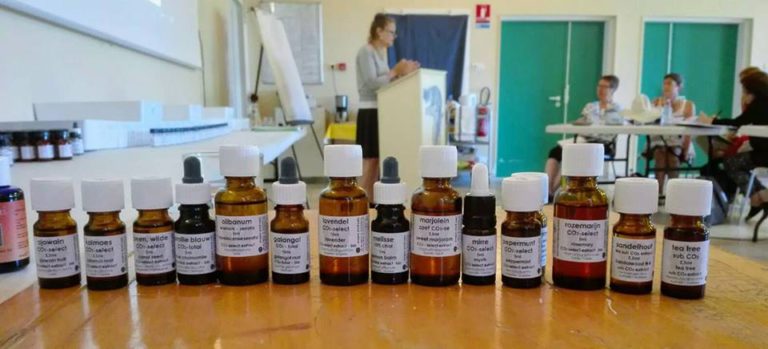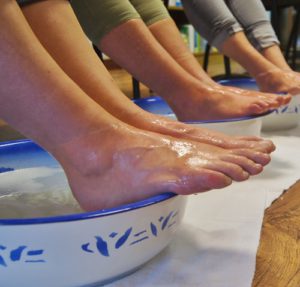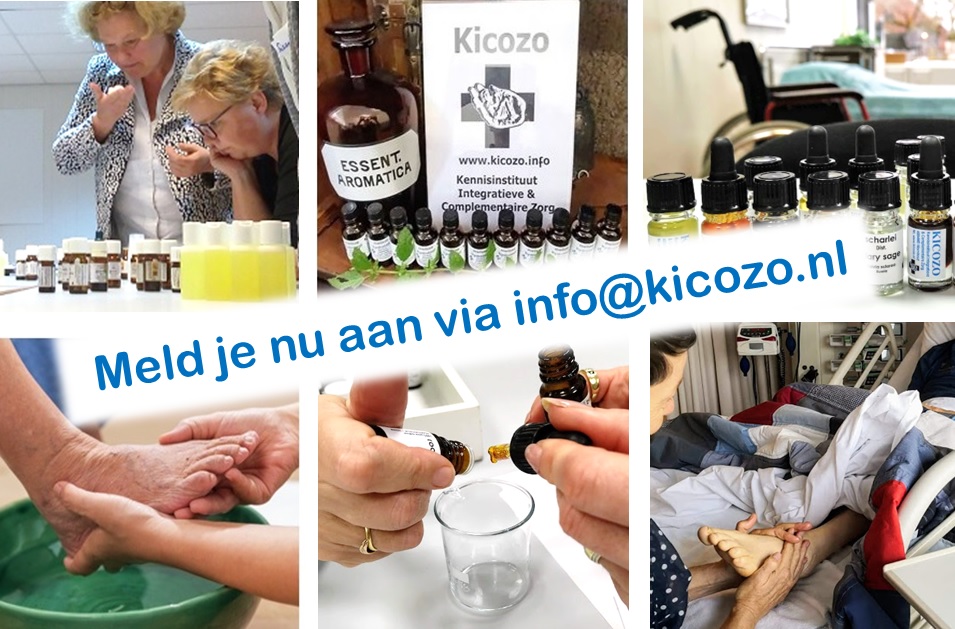
Complementary Therapies at Kicozo
At the Knowledge Institute for Complementary (Nursing) Care, we specialize in AromaCare (Aromatherapy), Massage, AquaCare and Relaxation techniques.
My team and I teach complementary therapies to professionals in health care (facilities).
Kicozo offers nurses, nurses aids, physicians, physiotherapists, social workers, but also other professionals, such as aromatherapists, massage therapists, holistic health care workers and other professionals in direct contact with their patients / clients the best nature has to offer. These professionals can work in the facility (hospices, nursing homes, day care centres, hospitals), home care or have a private practice.
Our passion is bringing the best of nature to those in need of extra special care. Our focus lies on care for the frailest people such as the elderly and those suffering from dementia or Huntington’s disease, and patients in oncology and palliative care.
To give you some background information I’ll elaborate a bit on the therapies we teach:
AromaCare
The word AromaCare is derived from Aromatherapy. In AromaCare fragrant essential oils, CO2 extracts and a range of base oils and base compounds are used to improve health and wellbeing. We specialize in clinical AromaCare.
AromaCare can actively support our physical health. Most important factors for the physical efficacy of aromatics are the individual molecules of the raw materials in question. Nowadays their medicinal properties are often backed by scientific research.

Aromatics can be very efficient in prevention and treating infections, such as colds, flu, pneumonia, skin infections and vascular inflammation. There are also oils that can highly contribute to the prevention and tackling of MRSA.
Many aromatics have extensive skin restoring properties as well, which makes them suitable for wounds, (radiation) burns, pressure sores, dry skin, eczema, skin infections of all kinds, etc. Some promote blood flow and can be used at a badly perfused skin or tissues. Others have cramp lifting properties. Think of indications, such as pains and cramps of muscles and tendons, bowel pains or menstruation cramps. Some oils can also be extremely useful for asthmatics.
AromaCare and fragrant essential oils and CO2 extracts can also have a profound impact on our emotional and mental, and also our spiritual wellbeing. After all, scent is a sense that can highly influence our mood. When you smell a certain fragrance, this provokes memories and images, and even sound and taste, reminiscing of days gone by. Feel good memories will always be relaxing and comforting. We strive to choose the right (combination of) fragrance to help patients with emotional and spiritual issues. Think of sadness, uncertainty, anxiety, shock and deep rooted fears, stress, nervousness, restlessness or insomnia, to name just a few.
The effect of AromaCare is of course depending on numerous factors including: their ingredients and actions, the quality of the raw materials; patient medical and personal history including an overview of existing medication from all origin, knowledge of possible interactions, the absorption capacity of the skin and mucous membranes, adequate functioning of liver, kidneys and lymphatic system, the ideal dosage in relation to the individual client, etc.
In addition to this, the method of administration (diffusion, inhalation, massage, baths, etc.) and of course how a scent(combination) is perceived by the recipient is also of huge importance.
Myth buster: natural medicine can’t hurt…
The first myth about working with AromaCare is that it is harmless because it is natural, or because it “is just a scent”. Another myth is that undiluted essential oils cure-alls, that can be ingested in a glass of water or rubbed neat on any body surface without problems.
When you look at the diversity of ingredients that make up an essential oil and the properties that they have as individual substance, but also in collaboration with other substances in that oil (which support their safety and of course their effectiveness), we must be aware, that some of these may lead to undesired side effects or that they may cause adverse effects or can interact with medication, depending on application method. Some patients react sensitively on fragrances, many elderly people smell less good or can no longer place the meaning of the scent of a once so relaxing fragrance due to cognitive limitations.
Offering AromaCare to patients in clinical settings (but also in your own environment) is much more than “just a scent”. Our advice is: seek professional education! We are there to help you learn how you too can offer the best of nature safely and effectively to patients.
You’ll find our English course program at https://www.kicozo.info/scholingen/professionals/calendar-global-activities-kicozo/

Touch & Massage
Being touched in a positive and attentive, loving way is vital to all of us. Many people will share hugs with their beloved partner, children and other beloved relatives and friends. Many will share close and intimate sensual contact with their partner. Some people will undergo regular massage by a masseur. We find that natural and usually enjoy touch and being touched.
However, once a person becomes a “patient” touch is experience in a different way. Especially when admitted to a hospital or nursing home “institutionalizing” takes place quite soon. There seems to be no space for any other kind of touch than technical nursing or medical forms of touch. Patients can easily forget that apart from suffering from a kind of illness that need care, they are also human beings with feelings and emotional and spiritual needs. In mainstream healthcare the focus lies mainly on functionality, when it comes to touch. Health care workers are washing bodies, rubbing ointments on, dressing wounds and give general care.
These days however, the enormous added value of giving gentle attentive touch and massage on all levels of wellbeing is increasingly recognized. Attentive touch and massage can make the recipient feel once more that his or her body can still be a source of pleasant sensation. In addition, massage can help relax and unwind. This way it has a positive effect on the overall sense of wellbeing.
By some groups of people the word “massage” can (still) be associated with intimate or sensual touch, which can make the threshold for being touched higher than necessary. In our training courses make touch and massage easy to do and to communicate to the receiver. We dig into the effects and beneficial factors that contribute to the effects of massage and of course discuss limitations and contra-indications. Much attention is paid to practicing massage.
 AquaCare
AquaCare
When using AquaCare – a term derived from the better known “hydrotherapy” – in health care we can use the various mechanisms of action of water to initiate reactions in parts of, or in the entire body.
AquaCare goes beyond taking a relaxing bath or shower. Using water techniques we can relieve cramps, improve muscle tone, reduce constipation, stimulate the metabolism, promote blood circulation, strengthen the vascular walls, positively influence inflammations, improve skin condition, and improve the stress response to help the patient relax more easily and sleep better.
I can safely say that I’m a successful pioneer in translating the many possibilities of hydrotherapy into simple AquaCare applications and integrate them in mainstream health care. Many healthcare centers such as hospitals, nursing homes and hospices, as well as home care organisations have now adopted many of the beneficial interventions and are excited about the simplicity and effectiveness.
 Relaxation techniques
Relaxation techniques
A state of relaxation is characterized by the absence of high muscle tension and feelings of anxiety and stress. The benefits of using a relaxation technique are overwhelming. Regular practice of relaxation techniques will assist patients in relieving muscle tension, reduce anxiety, and improve overall wellbeing. Other physiological benefits include: a decrease in heart and respiration rates, blood pressure, metabolic rate and oxygen consumption. Relaxation techniques include a number of practices such as progressive relaxation, guided imagery, self-hypnosis, and deep breathing exercises. The goal is similar in all: to consciously produce the body’s natural relaxation response, characterized by slower breathing, lower blood pressure, and a feeling of calm and wellbeing.
Practicing relaxation techniques on a daily basis can help achieve a general feeling of relaxation and increased wellbeing that benefits every area of body, mind and spirit. When patients feel relaxed and at ease, they feel more in control which leads to calm, realistic responses. In situations of (severe) illness relaxation techniques can make a huge difference in stress response and relieve symptoms, such as pain, dyspnoea, anxiety and fear, sleeping problems, nausea and vomiting, etc. In palliative and end-of-life care short exercises, adjusted to individual needs can be very helpful to patients and loved ones. Several studies support many of these claims. Relaxation techniques can also be of help in cases of lack of energy and fatigue. A short exercise from 5 to 20 minutes may be more effective than an hour sleep. The techniques are suitable for adults and children. Relaxation techniques can be successfully applied in many situations. It will take some effort from the patient to get himself acquainted with the technique, but once the exercise is done several times, optimal results will follow.



